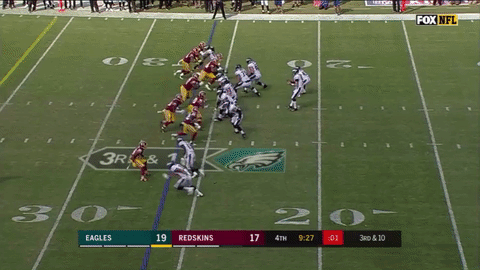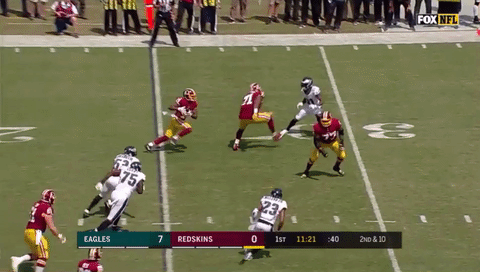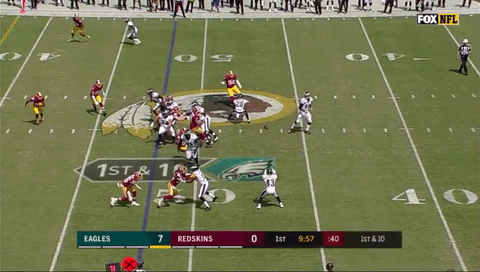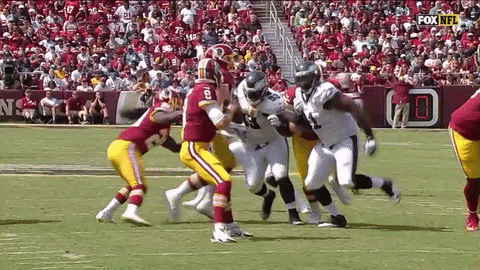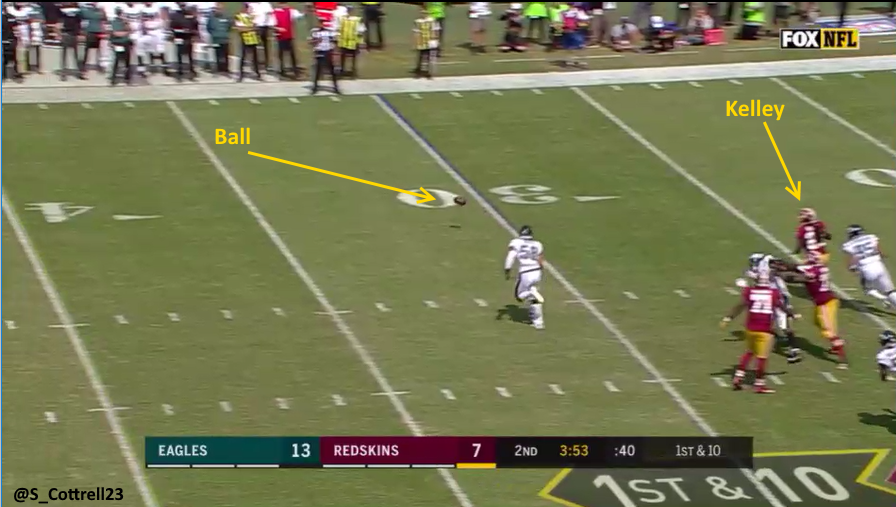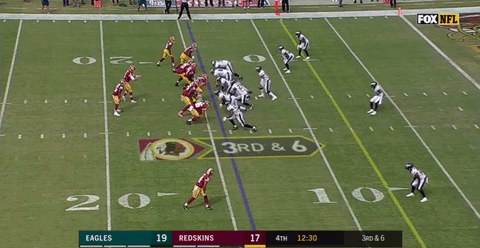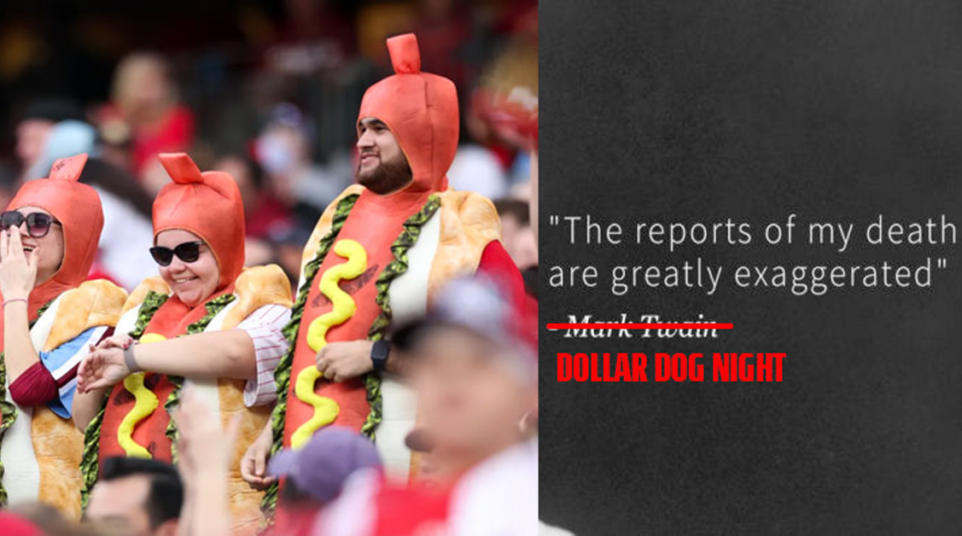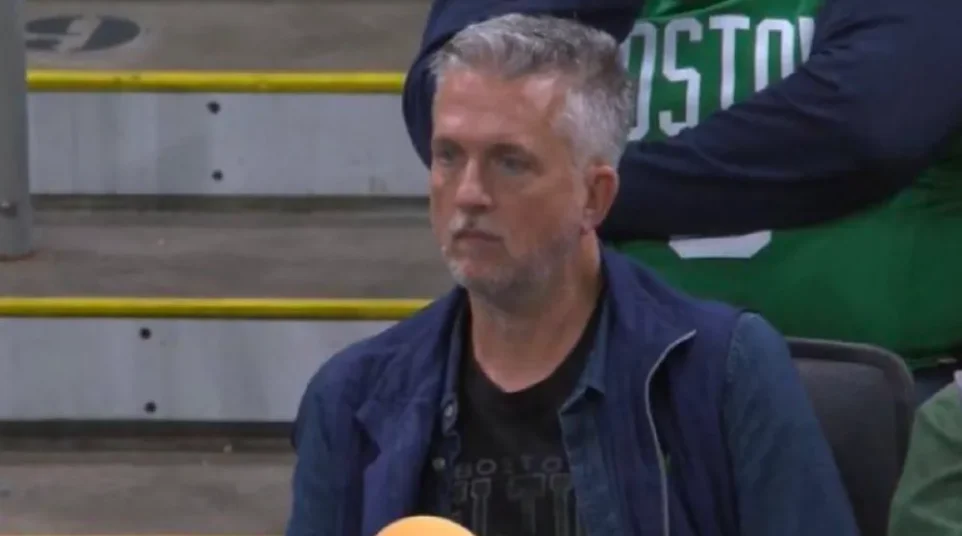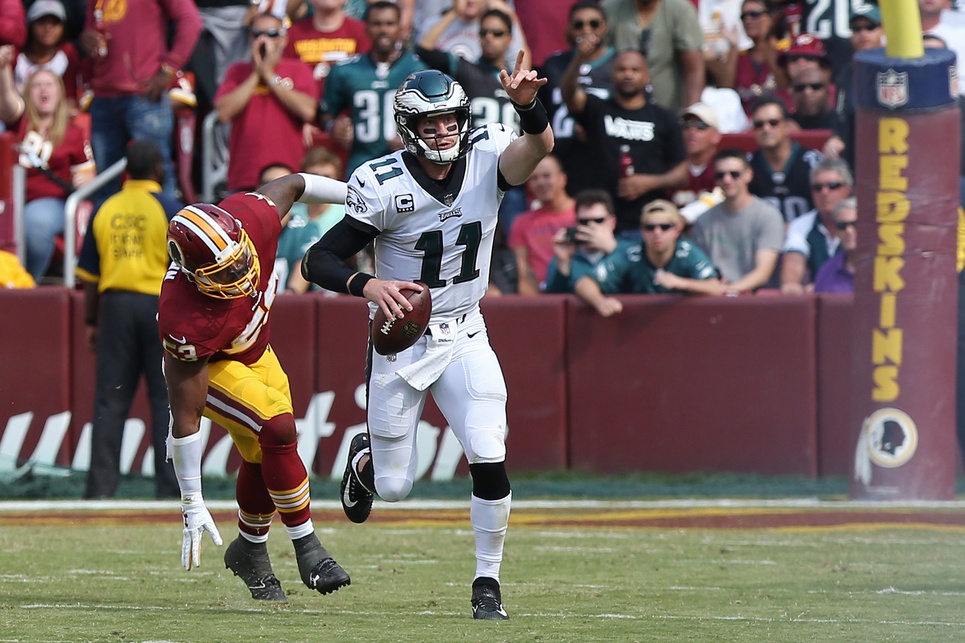
Three and Out: Wentz, Bad Officiating, and The Blitz
Each Monday during the football season, I will be breaking down three key facets of the previous day’s Eagles game in my “Three & Out” series. I may break down specific plays, discuss player performances, or big moments in the game, but my overall goal is to bring to your attention some really specific but important pieces of the game. I hope you enjoy it.
WHAT. A. GAME.
If you looked up NFC East in an online dictionary, there would be a four-hour long GIF of this game. This was the type of knock-down, drag-out brawl that this division builds its brand on. There were some highlights and head-scratching plays, but, at the end of the day, the Eagles walked away with the win, which, thankfully, makes this new week worth living through. A win is a win, especially in the NFC East.
Let’s dive into some of the specifics that made it happen.
Carson Wentz was $$ on Third Down
Games are won and lost on third down, and the Eagles’ third down efficiency is one reason they left Washington with a win. They converted on 8 of 14 third down attempts, good for a 57% conversion rate, a dramatic improvement over their 38% rate of conversion in 2016. In addition, they only ran the ball twice on third down (both times failing to pick up a new set of downs). So excluding those two attempts, the Eagles converted on 66% of their third down attempts, which was due, in large part, to Carson Wentz.
On the day, Wentz was 9-of-11 for 148 yards with two touchdowns on third downs alone. In addition, two of the Eagles’ field goals came on drives where Wentz converted a key third down to keep the drive alive. In total, Wentz’s third down wizardry is, in some way, responsible for 19 of the 22 offensive points that the Eagles put on the board.
Lost in all of the third down statistics, though, is maybe his best and most important play of the day.
It was early in the fourth quarter, and the Eagles were just barely holding onto a slim 19-17 lead after Jalen Mills intercepted an errant Kirk Cousins pass in the end zone. At the time, the defense had been on the field for the majority of the third quarter and much of what had gone by in the fourth. They had held their own to that point and were able to keep the game in check, despite being tired and allowing Washington to move up and down the field on its last two drives. If Wentz and the offense couldn’t keep them on the sideline, though, it wouldn’t be long before the levy would finally break.
Wentz took over at his own 15-yard line, ran two plays and converted a third-and-short on a quick out to Wendell Smallwood. Then Blount was stuffed for no gain and Wentz overthrew Torrey Smith on a deep ball on second down. The Eagles faced a third-and-long from their own 26. If they didn’t convert, it would’ve given Washington a short field to attack an exhausted defense. Time to panic? I definitely was. Sam Bradford probably would have. McNabb may have. Carson didn’t. Not even when Washington brought a seven-man blitz and linebacker Zach Brown flew in off the edge unblocked:
Wentz just calmly spins away, turns upfield and, in a move delightfully reminiscent of his touchdown throw to Darren Sproles in Week 3 against the Steelers in 2016, floats a perfect pass to Zach Ertz for a 23-yard gain. The Eagles ultimately punted on this drive, but this play bought the defense more time to catch their breath, changed the field position, and set up Donnie Long Ball’s beautiful punt which pinned the Redskins back on their one-yard line. This was a man’s play– not many NFL quarterbacks can make it. Wentz does it on the regular.
Third downs are just a small part of the game, but the Eagles would not have won this game without Wentz’s third down magic.
The Referees Were Low Key Horrible
I usually don’t like to pick on officials because they have a really difficult job. That said, Brad Allen and his crew had a pretty rough day.
Side Note: I’ve never even heard of Brad Allen before. Apparently he’s been officiating NFL games since 2014, if anyone cares.
The majority of their errors weren’t overly egregious, but I was keeping track and there were quite a few. We’re just not going to mention that late fumble ruling which cost the Redskins a chance at a comeback. Screw Washington though, the Eagles were raked over like four separate times with shit like that in 2016, so they can deal with it.
I counted nine total calls or non-calls, throughout the game, that went against the Eagles. It wasn’t so much the calls (or non-calls) themselves that bothered me, but the lack of consistency.
There were two specific examples that I want to focus on. The first came very early in the game. The Redskins ran a quick wide receiver screen to Ryan Grant, and All-Pro left tackle Trent Williams got out in space and mugged the shit out of Jalen Mills:
First, he wraps his arms around Mill’s head, then, as Mills turns to run and chase down the play, blatantly shoves him from behind. The play itself doesn’t bother me all that much– it’s football, it happens. Williams is arguably the best left tackle in the league right now, so if you want to throw him a bone, I’m all for it. But, on the very next drive, the Eagles threw a quick screen to Sproles, and when Jason Peters gave cornerback Bashaud Breeland a love tap, he got flagged for illegal block in the back. Where is Peters’ bone? (Poor choice of words maybe?)
This happened on the very next series after the non-call on Williams! Please explain to me how one gets called and the other doesn’t, I don’t understand.
The next incident was the intentional grounding non-call on Washington. The Redskins attempted a screen pass to fat Rob Kelley, but Kelley got caught up in the trash along the line and was nowhere near the ball when it landed. Yet, Allen and his crew said Kelley was in the area. Do you see Rob Kelley?
I’m honestly surprised Kelley didn’t make the catch. What a terrible drop by Kelley?
By the way, Washington later scored a touchdown on this drive, so this was not insignificant. Later in the game, Wentz would be called for intentional grounding. There is no case to be made for Wentz here– it was a good call, but again, consistency.
In total, the Eagles were penalized eight times for 76 yards compared to just two calls on the Redskins for 15 yards. Of course, the fumble call at the end more than made up for it.
Jim Schwartz Called a Masterfully Timed Blitz
Other than his apparent need for power, one of the bigger topics of debate surrounding Schwartz is his approach to blitzing, or lack thereof. The problem with blitzing, is that, in many cases, it leaves the secondary alone in man coverage, which is obviously not ideal for the Eagles, especially after Ronald Darby destroyed his ankle. With a sub-par secondary, Schwartz has little margin for error when he blitzes– he must call them at the perfect time or trouble could loom. Early in the fourth quarter, he called one that might have saved the game for the Eagles.
The Redskins had just driven the length of the field for the second straight drive. They trailed by two, but had the ball on the Eagles’ 14-yard line and all signs pointed to them taking the lead. Schwartz needed to do something as Cousins had been picking the defense apart and the Eagles’ pass rush was tiring. So, on third and 6, Schwartz unleashed a hellacious seven-man blitz:
This was a Cover-0 blitz, the mother of all blitzes, which means that there was no safety help on the play. All four players who didn’t blitz were in man-to-man coverage. Washington actually did a good job picking it up, but the Eagles brought one more man than the Redskins had to block, which left Jordan Hicks a free path to the quarterback. Cousins tried to get the ball to Jamison Crowder on the slant, but had to avoid Hicks’ outstretched hands. The ball sails just over Crowder’s head and lands into the waiting arms of Mills.
Game-changing play, which started the afeormentioned drive where Wentz made a key third down play to keep things going.
Schwartz has a great feel for the pulse of the defense and puts them in position to succeed. And succeed they did. Coaches almost always get too much of the blame when things go wrong, but almost never get the credit when things go right. Tip of the cap to Schwartz on this one.


